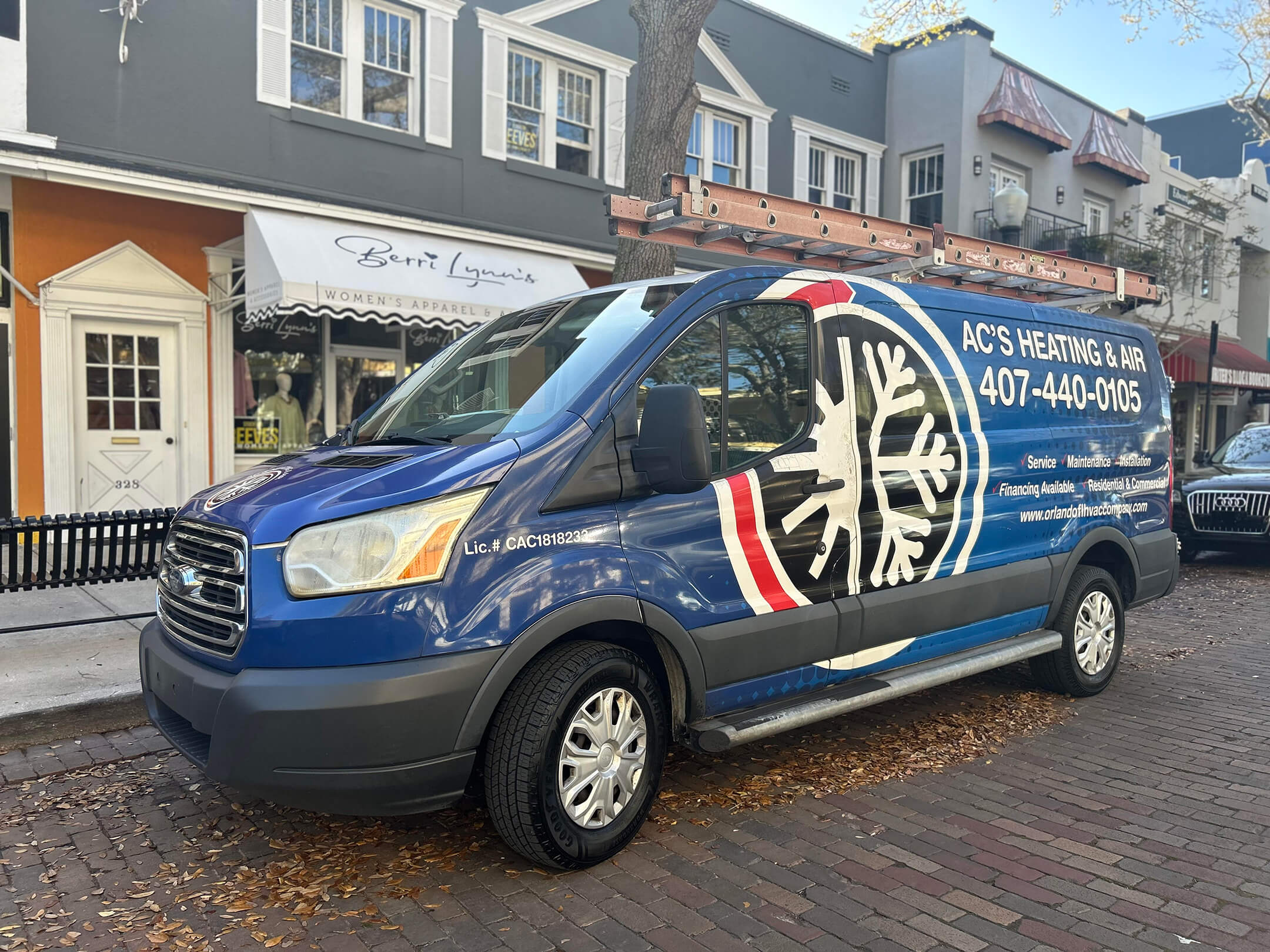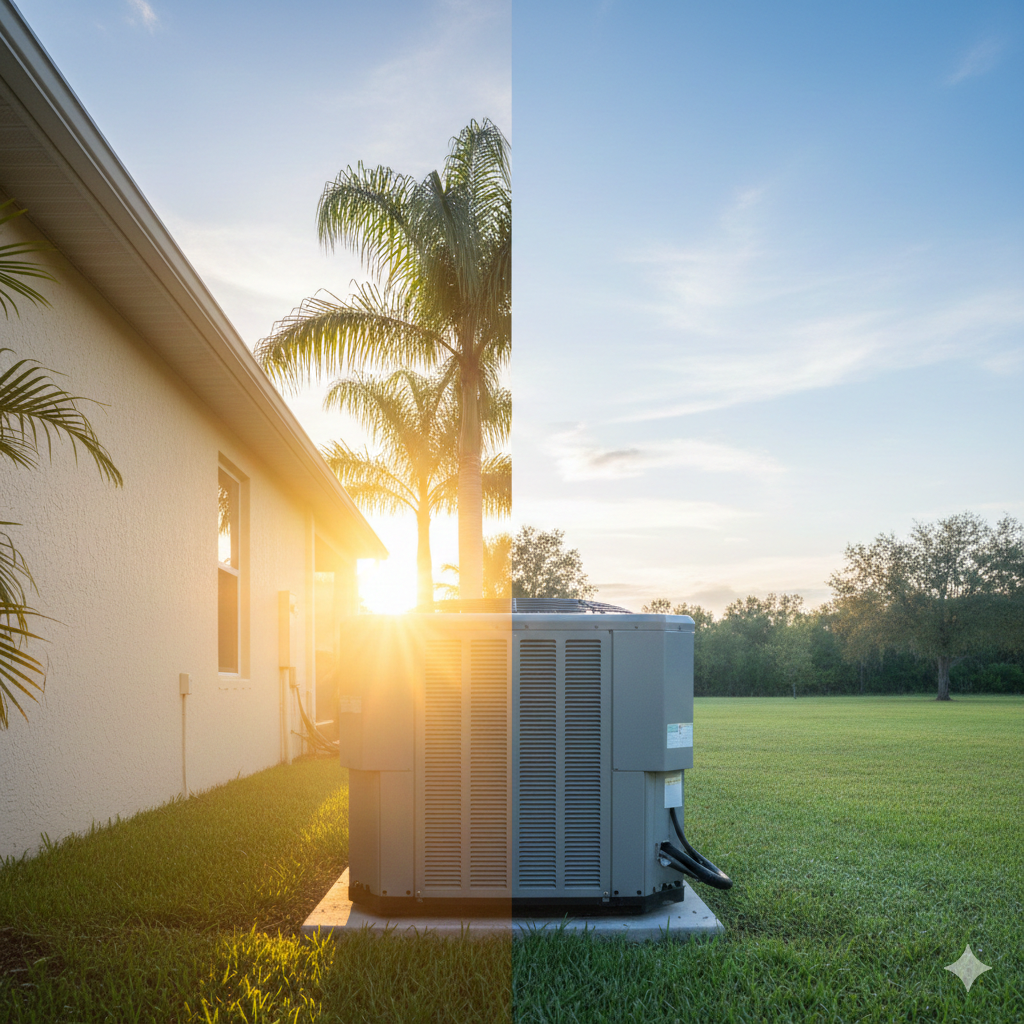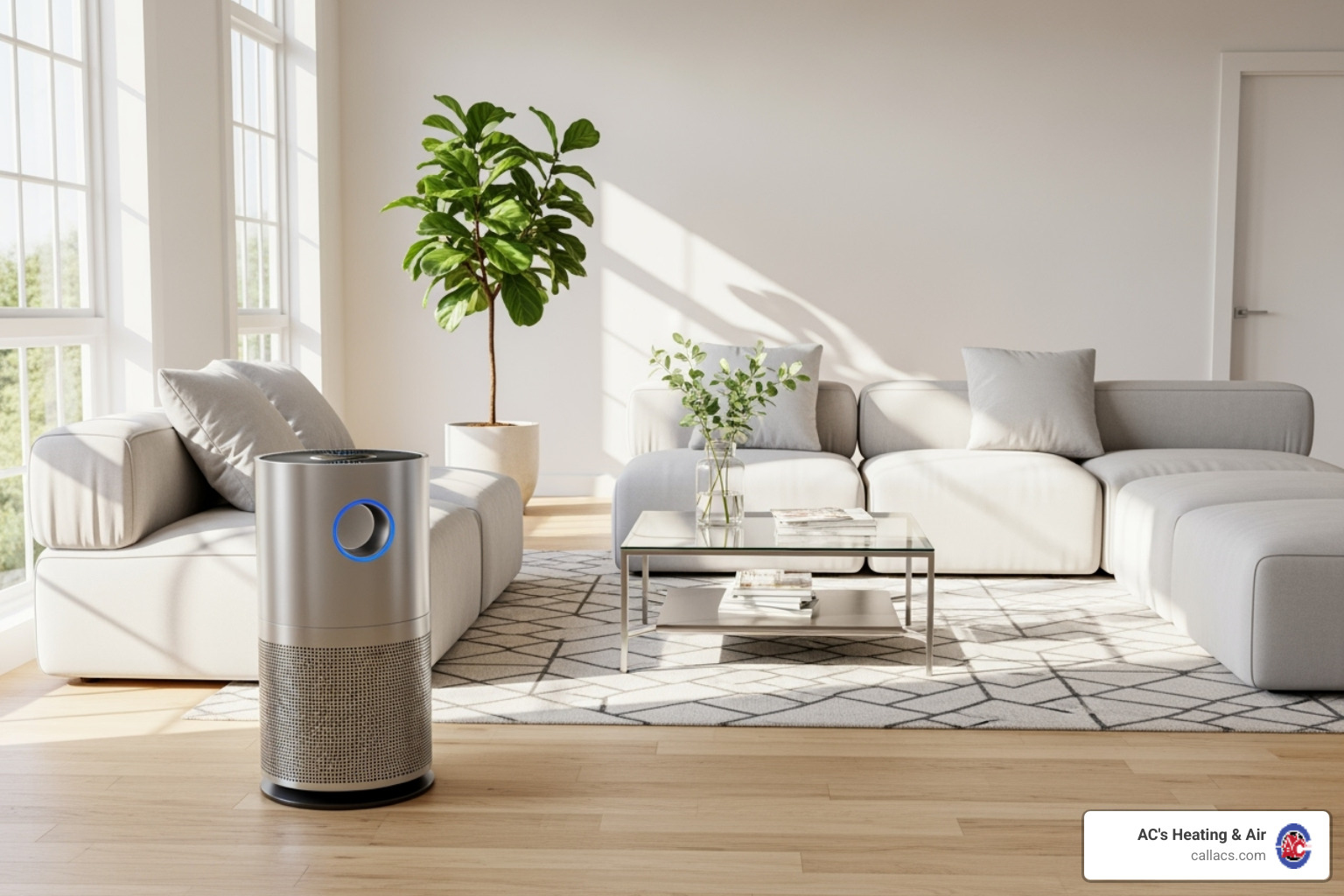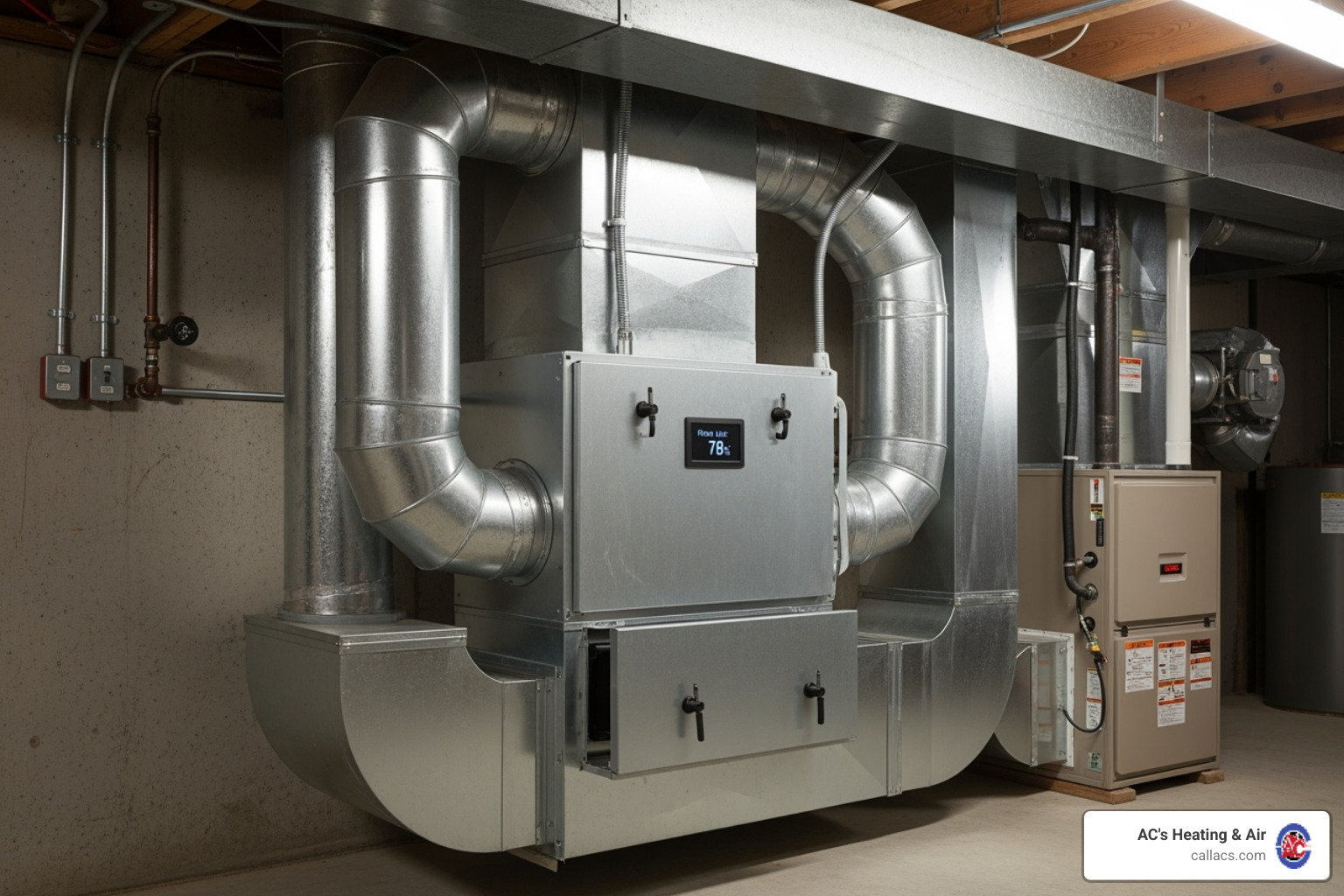Don't Get Left in the Cold—Top HVAC Maintenance Tips for Fall

Why Fall HVAC Maintenance Should Be Your Top Priority
Fall HVAC maintenance tips are essential for keeping your Central Florida home comfortable and safe as temperatures begin to drop. While our winters may be milder than northern states, your HVAC system still needs attention before the heating season begins.
Quick Fall HVAC Maintenance Checklist:• Replace air filters every 1-3 months (monthly if you have pets)• Clear debris from outdoor units and maintain 2-foot clearance• Test carbon monoxide detectors and replace batteries• Schedule professional tune-up before peak heating season• Check thermostat settings and reprogram for fall schedules• Inspect vents and registers for blockages or dust buildup• Seal air leaks around windows and doors to prevent 25-30% heat loss
The numbers tell the story clearly. Dirty air filters can reduce your HVAC system's efficiency by up to 15%, while heating equipment causes over 48,000 home fires each year due to poor maintenance. Even in Florida's mild climate, you can lose between 25% and 30% of your warm air through a drafty window.
Regular fall maintenance isn't just about comfort—it's about protecting your investment. Well-maintained HVAC systems can last 15-20 years, compared to just 10-15 years for neglected units. Plus, most manufacturers require annual preventive maintenance to keep warranties valid.
I'm Allen Chenault, owner and founder of AC's Heating & Air LLC, and I've spent over 2 decades helping Central Florida homeowners master their fall HVAC maintenance tips to avoid costly winter breakdowns. My team has seen how a simple autumn tune-up can save thousands in emergency repairs and keep families comfortable all season long.

Simple fall HVAC maintenance tips word guide:- Winter Park AC installation, - Best HVAC system
Why Fall Maintenance Is Non-Negotiable
Here in Central Florida, I hear this question all the time: "Allen, it's Florida—how much heating do we really need?" While our winters might be gentler than up north, your HVAC system has been working overtime through those brutal summer months. Think of it like a marathon runner who needs proper care after crossing the finish line.
Fall HVAC maintenance tips aren't just suggestions—they're essential for protecting your investment and keeping your family safe. Your system needs attention for energy efficiency, system longevity, warranty protection, fire safety, comfort, and utility savings. Well-maintained systems use 5-15% less energy per year, which means real money back in your pocket every month.
After months of 90-degree days and crushing humidity, your HVAC system is like a car that's been driven hard across the country. You wouldn't skip that oil change after a cross-country road trip, would you? The same logic applies here—components need inspection, cleaning, and adjustment to smoothly transition from cooling to heating mode.
One costly mistake I see homeowners make is thinking they can save money by closing off unused rooms. The reality is that closing or blocking your vents will cost you more over the season. This actually forces your system to work harder and can lead to expensive component failures down the road.
Hidden Costs of Skipping Service
The numbers don't lie when it comes to skipping fall maintenance. Homeowners can lose 25-30% of their heated air through preventable issues like leaky ducts, worn weatherstripping, and clogged filters. That's literally like throwing money out your window.
Fire safety is another serious concern. The National Fire Protection Association reports that heating equipment causes over 48,000 home fires annually, with poor maintenance being the leading cause. Here in Florida, where many folks rarely think about heating safety, this statistic should be a wake-up call.
When your system breaks down during peak winter months, emergency repairs can cost 2-3 times more than preventive maintenance. I've seen simple issues like dirty flame sensors snowball into complete furnace replacements because they were ignored. A maintenance visit can prevent thousands in emergency replacement costs.
Perhaps the most painful hidden cost is premature system replacement. HVAC systems that receive regular care can last 15-20 years, while neglected systems often fail after just 10-12 years. On a typical system investment, that's like losing thousands in value simply due to poor maintenance habits.
The good news? All of these costly problems are completely preventable with proper fall maintenance. Taking care of your system now means avoiding headaches and unexpected expenses later.
Essential Fall HVAC Maintenance Tips Checklist

Here's the truth about fall HVAC maintenance tips: some tasks are perfect weekend projects, while others require the expertise and tools that only licensed professionals have. After eight years in the Central Florida HVAC business, I've learned that the smartest homeowners know the difference—and it saves them both money and headaches.
Think of it like car maintenance. You can check your oil and change your air filter, but you probably wouldn't attempt to rebuild your transmission. Your HVAC system works the same way.
DIY fall HVAC maintenance tips you can tackle this weekend
Start with your air filter—it's the most important task you can do yourself. I tell my customers to think of it as their system's lungs. When filters get clogged with dust, pet hair, and debris, your system has to work 15% harder to breathe. That translates directly to higher electric bills and stressed components.
Replace filters every one to three months, depending on your household. Got pets or family members with allergies? Monthly changes are your best bet. Skip the cheapest fiberglass filters—they're like trying to catch baseballs with a tennis racket. Invest in high-efficiency pleated filters with electrostatic charges. They cost a few dollars more but trap smaller particles and protect your system better.
Your outdoor unit needs attention too, especially during Central Florida's fall season when leaves and seed pods seem to find their way everywhere. Clear all debris from around the unit and maintain at least two feet of clearance on all sides. I've seen efficiency drop by 30% when outdoor units get choked with leaves and grass clippings.
Walk through your home and check every vent and register. Vacuum away dust buildup and make sure nothing blocks the airflow—no furniture pushed against vents, no curtains draped over returns, no storage boxes stacked nearby. Your system is designed to move air freely, and blocked vents force it to work much harder than necessary.
If you have a whole-house humidifier, fall is the perfect time to replace the water panel and restart the system after its summer vacation. Turn off the water supply during cooling season, then replace the humidifier pad before firing it back up. This prevents mold growth and ensures comfortable humidity levels when heating season arrives.
Don't forget the safety basics: replace batteries in carbon monoxide detectors, smoke alarms, and programmable thermostats. Test each device to make sure it's working properly. This simple step takes ten minutes but could save your family's life.
For a detailed timeline on when to tackle these tasks, check our HVAC Filter Replacement Schedule guide.
Fall HVAC maintenance tips every homeowner should schedule professionally
Some tasks require specialized equipment, training, and licensing that homeowners simply don't have access to. Combustion analysis and safety inspection top this list. We use digital analyzers to test combustion efficiency and check for dangerous carbon monoxide leaks. There's no safe way for homeowners to do this themselves.
Heat exchanger inspection is another critical professional task. The heat exchanger is your furnace's most important safety component—cracks can allow deadly carbon monoxide into your home. Our technicians use specialized cameras and tools to inspect areas that are completely inaccessible to homeowners.
Ductwork sealing and inspection might look straightforward, but it requires pressure testing equipment and thermal imaging to find hidden leaks. We've seen well-meaning homeowners make duct problems worse by sealing the wrong areas or using inappropriate materials. Professional duct sealing can improve efficiency by up to 30%.
Even if your system primarily cools your home, refrigerant level checks are essential for heat pump operation during our mild Central Florida winters. Low refrigerant reduces efficiency and can damage expensive compressor components. Only licensed technicians can legally handle refrigerant—it's not just a safety issue, it's the law.
Electrical connection maintenance is where things get dangerous for DIY enthusiasts. Loose connections cause system failures and fire hazards. Our technicians check and tighten all connections, test voltage and amperage, and replace worn components before they fail. One loose wire can destroy a circuit board that costs more than annual maintenance.
Our comprehensive Pre-Season HVAC Tune-Up guide explains exactly what professional maintenance includes and why each step matters.
Task CategoryDIY TasksProfessional TasksSafetyTest CO detectors, replace batteriesCombustion analysis, heat exchanger inspectionEfficiencyReplace filters, clear ventsDuct sealing, refrigerant checkMaintenanceClean outdoor unit, dust registersElectrical connections, lubricationFrequencyMonthly to seasonalAnnual or bi-annual
The bottom line? Fall HVAC maintenance tips work best when you combine smart DIY care with professional expertise. Handle the routine tasks yourself, but trust the complex and dangerous work to licensed professionals who have the right tools and training.
Energy Efficiency & Safety Checks

Here's something we've learned after years of service calls in Central Florida: the best fall HVAC maintenance tips always combine energy efficiency with safety. You can't have one without the other, and homeowners who understand this connection see the biggest improvements in both comfort and monthly bills.
Florida's fall weather keeps us on our toes. One day it's 85 degrees and humid, the next morning you're reaching for a sweater. Your HVAC system needs to handle these swings smoothly, which is why efficiency and safety checks are so important during this transition season.
We've seen too many homes where simple efficiency problems became safety hazards. A blocked vent leads to system strain, which leads to overheating, which can lead to equipment failure or worse. The Department of Energy reports that you can lose between 25% and 30% of your warm air through a drafty window, but the same air leaks that waste energy can also allow dangerous gases to enter your home.
That's why our approach addresses both efficiency and safety together. We check for air leaks while testing for proper ventilation. We measure airflow while inspecting for carbon monoxide risks. This comprehensive method has helped families from Winter Park to Apopka stay safe and comfortable while keeping their energy bills manageable.
Our detailed HVAC Preventive Maintenance Plan explains how we systematically address every aspect of your system's performance and safety.
Tune Your Thermostat for Fall
Getting your thermostat settings right for Florida's unpredictable fall weather is more art than science. We recommend 68 degrees as your baseline when you're home and need heating, but the real magic happens with smart scheduling.
Programmable thermostats are game-changers in our climate. Set them to automatically adjust throughout the day as temperatures swing. Program a setback to 60-62 degrees when you're sleeping or away for more than four hours. The Department of Energy confirms you'll save about 1% on energy costs for every degree you set back for eight hours or more.
Smart thermostats take this even further by learning your family's routines and adjusting automatically. They can sense when you're home or away and make adjustments that can reduce your heating and cooling bills by up to 10%. Plus, you can adjust settings remotely when Florida's weather surprises you.
If you have multiple zones in your home, fall is the perfect time to optimize each area. Close off unused guest rooms or storage areas, but remember our rule: never close more than 20% of your vents. We've seen expensive system damage from homeowners who thought they were saving money by closing too many vents.
Safety Devices & Fire Prevention
Carbon monoxide safety isn't something we take lightly, especially during heating season. This invisible, odorless gas can be deadly, and Florida's mild climate sometimes makes homeowners complacent about heating safety. Test your CO detectors every month and replace batteries annually—we recommend doing it when daylight saving time changes so you'll remember.
Install detectors near sleeping areas and on every level of your home. We've responded to emergency calls where working CO detectors literally saved lives. It's not worth the risk to skip this simple step.
Smoke alarm maintenance goes hand-in-hand with heating safety. The National Fire Protection Association's research shows that heating equipment causes over 48,000 home fires each year, but working smoke alarms cut fire death risk in half. Replace those batteries at the same time you change your CO detector batteries.
Keep combustible materials away from heating equipment—at least three feet of clearance around furnaces, water heaters, and any heating appliances. We've seen too many close calls where holiday decorations, cleaning supplies, or seasonal storage created fire hazards in utility rooms.
Following NFPA safety standards isn't just good practice—it's essential protection for your family. These guidelines exist because heating-related fires are almost always preventable through proper maintenance and basic safety measures. Don't let a preventable accident happen in your home.
When to Call the Pros & What to Expect

After eight years of helping Central Florida families with their fall HVAC maintenance tips, I've learned that timing is everything. The difference between a smooth autumn transition and a costly emergency often comes down to recognizing when your system needs professional attention.
Many homeowners try to handle everything themselves, and while I appreciate the DIY spirit, some tasks require specialized training and equipment. When you thoroughly inspect your HVAC system properly, you need tools that can detect gas leaks, measure electrical loads, and analyze combustion efficiency—things that simply aren't safe for homeowners to attempt.
The good news? Professional maintenance is an investment that pays for itself. Our fall HVAC maintenance tips include professional services that keep your warranty valid, prevent emergency breakdowns, and ensure your family's safety throughout the heating season.
We've designed our service approach specifically for Central Florida's unique climate challenges. From the humidity in Winter Park to the temperature swings in Orlando, our technicians understand what your system faces year-round. Our Maintenance Plans reflect this local expertise, giving you peace of mind no matter what weather comes your way.
Early Warning Signs You Need Help
Your HVAC system usually gives you warning signs before it fails completely. Strange noises are often the first red flag we hear about from homeowners. That banging sound when your system starts up? It could mean loose components that will cause bigger problems if ignored. Squealing usually points to belt or motor issues, while grinding sounds make us think about bearing failures.
I always tell my customers: if you hear something new and concerning, turn off your system and give us a call. Running equipment with mechanical problems can turn a simple repair into a complete replacement.
Uneven temperatures throughout your home are another clear sign you need professional help. When your living room is comfortable but your bedroom feels like an icebox, you're dealing with airflow or ductwork issues that require diagnostic equipment to solve properly.
Rising energy bills without any change in your usage patterns often indicate efficiency problems that homeowners can't see. Dirty coils, low refrigerant levels, or failing components force your system to work much harder than it should.
Don't ignore persistent odors either. Musty smells usually mean mold growth somewhere in your system, while burning odors can indicate electrical problems or overheating components. Any gas odors require immediate professional attention—this isn't something to investigate on your own.
Scheduling the Perfect Fall Appointment
Fall is honestly the best time of year to schedule professional maintenance, and it's not just because I'm trying to drum up business. During our off-peak season, you get better scheduling flexibility and more thorough service because we're not rushing between emergency calls in 95-degree heat.
Regional climate factors make fall maintenance especially important in Central Florida. Our mild winters might fool you into thinking your heating system doesn't need attention, but Florida's year-round humidity creates unique challenges like mold growth and corrosion that require professional expertise to address.
During your fall appointment, we also conduct a lifespan assessment of your equipment. If your system is approaching 10-15 years old, we'll help you understand what to expect and plan for eventual replacement. Sometimes the most valuable part of maintenance is learning when it's time to start shopping for new equipment.
Fall is also ideal for replacement considerations if your system is on its last legs. Equipment availability is better, installation crews have more time to do quality work, and you can research your options without the pressure of a summer breakdown. Plus, you'll be ready for whatever weather surprises Florida throws at you.
Frequently Asked Questions about Fall HVAC Maintenance
How often should I replace my HVAC filter, and why?
This is hands down the most common question we get from Central Florida homeowners, and for good reason. Your filter is your HVAC system's first line of defense, and in Florida's year-round climate, it works overtime.
Check your filter monthly, but replace it every 1-3 months depending on your specific situation. I always tell homeowners to set a phone reminder—it's that important. A dirty filter doesn't just reduce air quality; it forces your system to work 15% harder and can damage expensive components like blower motors.
Here's what we've learned after thousands of service calls: homes with pets need monthly filter changes due to hair and dander buildup. Allergy sufferers should replace filters every 30-45 days for better air quality. If you live near construction or have ongoing landscaping, you might need monthly changes during those periods.
Pleated filters are your best bet for most Florida homes. Skip the cheap fiberglass filters—they're false economy. Quality pleated filters trap smaller particles and last longer. HEPA filters work great for specialty applications but need professional sizing. Washable filters can work, but they require monthly cleaning and replacement every 2-3 years.
The few dollars you spend on quality filters saves hundreds in repair costs. We've seen blower motors fail because dirty filters restricted airflow, and evaporator coils freeze because the system couldn't breathe properly.
What outdoor-unit steps prevent winter damage?
Even though our Florida winters are mild, your outdoor unit still needs attention after working hard all summer. Think of it as giving your system a well-deserved break and preparing it for the occasional cold snap.
Start with debris clearance around your unit. Maintain 2-3 feet of space on all sides. During fall, check weekly for leaves, seed pods, and grass clippings. Those beautiful oak trees and palms can dump a lot of debris, and clogged coils mean poor efficiency.
Gentle coil cleaning makes a huge difference. Use your garden hose on a gentle setting, spraying from inside the unit outward. Never use a pressure washer—those delicate aluminum fins damage easily. We recommend monthly cleaning during heavy pollen seasons, which in Central Florida can feel like year-round.
Check that your electrical disconnect switch operates smoothly and hasn't been damaged by landscaping activities. Look at the refrigerant line insulation too—damaged insulation from weather or critters reduces efficiency and can cause condensation problems.
Make sure your unit sits level on its pad. Florida's sandy soil and heavy rains can cause settling. A tilted unit creates vibration and premature wear on expensive components.
Which tasks are safe DIY, and which require a professional?
This question keeps me up at night because we've seen too many well-intentioned homeowners turn minor issues into major repairs. The key is knowing your limits and respecting the complexity of modern HVAC systems.
You can safely handle filter replacement, outdoor unit cleaning, and basic maintenance like dusting vents and maintaining clearances. These fall HVAC maintenance tips keep your system running smoothly between professional visits. Replace thermostat batteries, clear debris, and do visual inspections—these tasks are straightforward and safe.
Stop there. Everything involving electricity, refrigerant, or gas requires professional training and licensing. Heat exchanger inspections, combustion analysis, and electrical work aren't DIY projects. We use specialized tools and have insurance for a reason.
If you smell gas, see sparks, or hear grinding noises, turn off your system immediately and call us. The same goes for any situation that makes you uncomfortable. Trust your instincts—they're usually right.
Professional maintenance isn't just about safety; it's about protecting your warranty and ensuring code compliance. Licensed technicians understand Florida's specific requirements and manufacturer specifications. We catch problems before they become emergencies, and our work comes with guarantees that DIY repairs can't match.
The money you save attempting complex repairs yourself often gets spent twice when we have to fix the original problem plus the DIY damage. Let us handle the technical stuff while you focus on the simple maintenance that keeps everything running smoothly.
Conclusion

Think of these fall HVAC maintenance tips as an investment in your family's comfort and your wallet's happiness. After serving hundreds of Central Florida families, we've watched homeowners save thousands simply by taking action before problems start.
The math is pretty convincing. Well-maintained systems slash energy bills by 5-15% while lasting up to 5-8 years longer than neglected ones. That's real money staying in your pocket instead of going to the utility company or emergency repair calls.
But here's what really matters to us—the peace of mind you get knowing your family is safe and comfortable. When that first chilly morning hits Orlando or Winter Park, you'll sleep better knowing your heating system is ready. No midnight emergency calls, no shivering while waiting for repairs, no wondering if your carbon monoxide detectors are working properly.
We've built AC's Heating & Air around understanding what Central Florida homeowners really need. Our climate is unique—one day you need air conditioning, the next you're reaching for the thermostat to warm things up. Your HVAC system needs to handle these constant changes without missing a beat.
The return on investment starts immediately. Every month you'll see lower utility bills. Every year you'll avoid costly emergency repairs. Every decade you'll postpone expensive system replacements. Most importantly, every day you'll breathe cleaner air and enjoy consistent comfort.
Don't gamble with your family's comfort this fall. The small investment in maintenance today prevents the big headaches tomorrow. Whether you're in Apopka, Winter Garden, or anywhere in between, we're here to help you get the most from your HVAC investment.
Ready to give your system the attention it deserves? Contact us today to schedule your fall maintenance visit and find more about our comprehensive air-conditioning services designed specifically for Florida's unique climate challenges.



